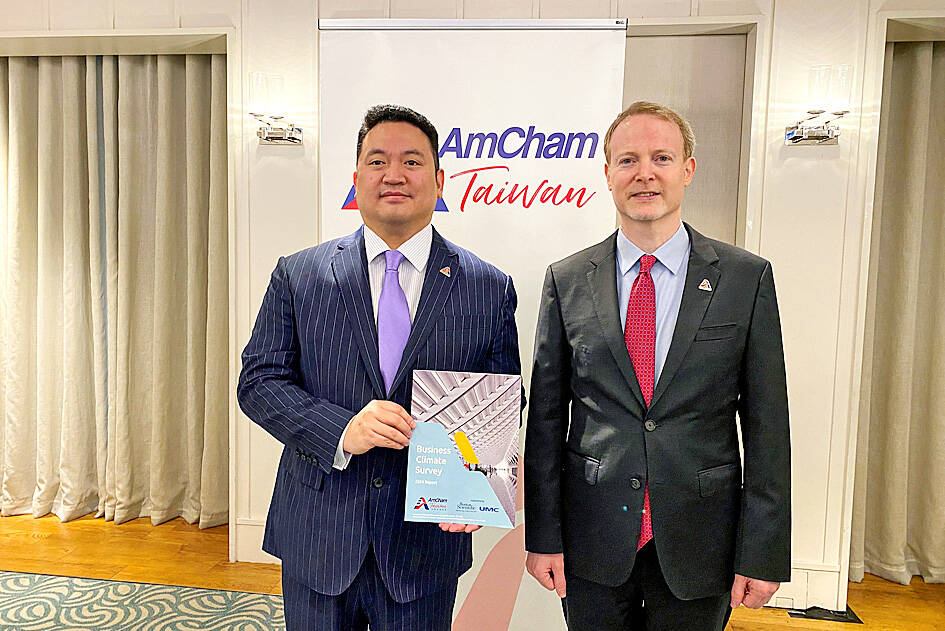Most US firms in Taiwan have expressed a high level of confidence in the local economy and their own business prospects for the coming year and beyond, as Taiwan emerges from a post-COVID-19 pandemic dip, the American Chamber of Commerce Taiwan (AmCham) said yesterday.
The chamber of more than 580 companies reached that conclusion after an annual poll found that more than 80 percent of companies voiced confidence in the economic outlook this year and an even higher 85 percent are positive about the next three years.
Meanwhile, nearly 83 percent are optimistic about their revenue prospects in the coming 12 months and 87 percent are confident over the next three years.

Photo: Ben Blanchard, Reuters
“Members are committed to the [local] market, with 92 percent saying they plan to maintain or increase investment in Taiwan this year,” AmCham chairman Dan Silver said.
The survey informs the chamber’s advocacy agenda for the coming year and serves as a resource for the Taiwanese and US governments, as well as others interested in US-Taiwan economic relations.
Despite the sentiment uptick, satisfaction with the regulatory environment has remained stagnant, as 43 percent said that regulations are not updated sufficiently in response to changing needs.
AmCham called on the government to make exceptional efforts to reduce bureaucracy and fine-tune regulations.
Meanwhile, 71 percent of companies expressed concern over the availability of green energy and 39 percent urged the government to make energy sufficiency its top priority.
In line with the nation’s pursuit of net zero carbon emissions by 2050, 61 percent of US companies here have formally committed to achieving net zero emissions and using 100 percent renewable energy, the survey found.
Though national security and cross-strait relations are considered important, a majority said they had not been significantly disrupted by increased tensions last year, although 35 percent said they are revising business continuity plans to address the geopolitical climate.
As for human capital, 55 percent reported plans to expand their workforce this year, it said, adding that companies urged the government to prioritize talent development and retention to maintain international competitiveness.
While appreciative of the nation’s stable and safe environment, AmCham members are concerned about road safety, quality of old buildings, the aging population and regulations that fall short of meeting economic needs.
In addition, a big majority, 72 percent, consider it important to their business that Taiwan secured a bilateral trade agreement with the US, the nation’s second-largest trading partner.
Members view the chapter on good regulatory practices as the most important section for their business, it said.
Support is widespread for the signing of a second agreement and swift implementation of the US-Taiwan Initiative on 21st-Century Trade, it said.

‘CORRECT IDENTIFICATION’: Beginning in May, Taiwanese married to Japanese can register their home country as Taiwan in their spouse’s family record, ‘Nikkei Asia’ said The government yesterday thanked Japan for revising rules that would allow Taiwanese nationals married to Japanese citizens to list their home country as “Taiwan” in the official family record database. At present, Taiwanese have to select “China.” Minister of Foreign Affairs Lin Chia-lung (林佳龍) said the new rule, set to be implemented in May, would now “correctly” identify Taiwanese in Japan and help protect their rights, the Ministry of Foreign Affairs said in a statement. The statement was released after Nikkei Asia reported the new policy earlier yesterday. The name and nationality of a non-Japanese person marrying a Japanese national is added to the

AT RISK: The council reiterated that people should seriously consider the necessity of visiting China, after Beijing passed 22 guidelines to punish ‘die-hard’ separatists The Mainland Affairs Council (MAC) has since Jan. 1 last year received 65 petitions regarding Taiwanese who were interrogated or detained in China, MAC Minister Chiu Chui-cheng (邱垂正) said yesterday. Fifty-two either went missing or had their personal freedoms restricted, with some put in criminal detention, while 13 were interrogated and temporarily detained, he said in a radio interview. On June 21 last year, China announced 22 guidelines to punish “die-hard Taiwanese independence separatists,” allowing Chinese courts to try people in absentia. The guidelines are uncivilized and inhumane, allowing Beijing to seize assets and issue the death penalty, with no regard for potential

‘UNITED FRONT’ FRONTS: Barring contact with Huaqiao and Jinan universities is needed to stop China targeting Taiwanese students, the education minister said Taiwan has blacklisted two Chinese universities from conducting academic exchange programs in the nation after reports that the institutes are arms of Beijing’s United Front Work Department, Minister of Education Cheng Ying-yao (鄭英耀) said in an exclusive interview with the Chinese-language Liberty Times (the Taipei Times’ sister paper) published yesterday. China’s Huaqiao University in Xiamen and Quanzhou, as well as Jinan University in Guangzhou, which have 600 and 1,500 Taiwanese on their rolls respectively, are under direct control of the Chinese government’s political warfare branch, Cheng said, citing reports by national security officials. A comprehensive ban on Taiwanese institutions collaborating or

STILL COMMITTED: The US opposes any forced change to the ‘status quo’ in the Strait, but also does not seek conflict, US Secretary of State Marco Rubio said US President Donald Trump’s administration released US$5.3 billion in previously frozen foreign aid, including US$870 million in security exemptions for programs in Taiwan, a list of exemptions reviewed by Reuters showed. Trump ordered a 90-day pause on foreign aid shortly after taking office on Jan. 20, halting funding for everything from programs that fight starvation and deadly diseases to providing shelters for millions of displaced people across the globe. US Secretary of State Marco Rubio, who has said that all foreign assistance must align with Trump’s “America First” priorities, issued waivers late last month on military aid to Israel and Egypt, the